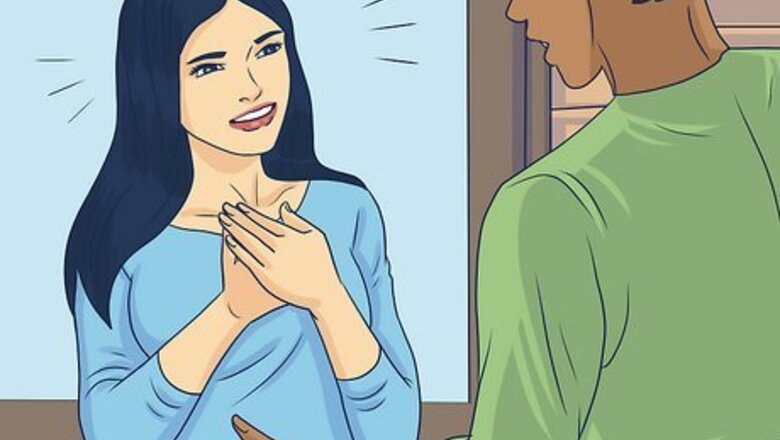
views
Being Kind

Thank the asker. Remember that it took a lot of courage for the person to ask you out. If you genuinely appreciate him for asking, thanking him will soften the blow of your refusal.
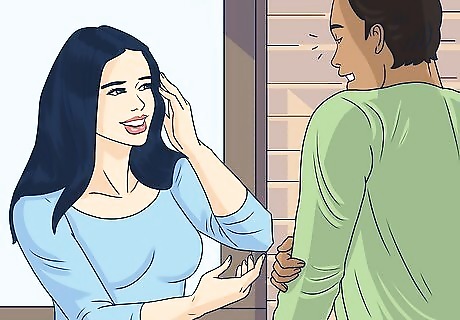
Compliment the person. Be kind and give them positive feedback before your refusal. Be specific about what you do like or appreciate about her. Some examples of compliments you could give include: “You’re so much fun to spend time with, but...” “You’ve been a great friend these past few months, but…” “You’re really thoughtful and nice to think of me, but…”

Be mindful of your body language. You might speak clearly and assertively, but you may send unintended or confusing messages with your body language. Don't pull away from the person, but don't lean in, either. Keep your arms uncrossed, make eye contact, and smile gently. This is an awkward situation, but allow your body language to be relaxed — try not to clench your jaw, furrow your brow, or compress your lips into a tight line, which may appear harsh and mean.
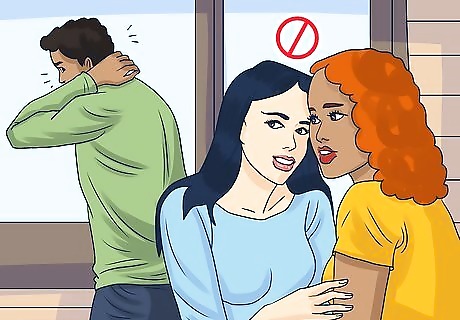
Avoid gossiping. It might have been funny to you that this person asked you out or it may be tempting to talk about it with your best friends. Don’t spread the news of this person asking you out. Respect her feelings and remember that it took courage for her to ask you in the first place. If the person asked you out via text, avoid keeping the text message or showing it to anyone else. If the person asked you out via social media, do not take a screenshot of the message and show it to others.
Saying No

Be honest. Give them him truth about your reasons for refusal. You don’t have to be overly blunt or rude, but you should be clear about why you’re not interested. Avoid vague excuses or blatant lies. If you get asked out on a second or third date from someone you find unattractive, you might say, “I had a lot of fun with you on our first date, but I’m just not interested in you in that way.” This can be easier to hear than “I don’t find you attractive.” If you get asked out by someone new at school or work who doesn’t know you’re in a relationship already, you can say, “I really appreciate you asking and it’s been nice getting to know you, but you should know I’m already in a relationship with someone else.”

Avoid being a people-pleaser. It’s normal to want to avoid any feelings of discomfort or awkwardness, but do not say “yes” just to make the person feel better. If you go on to refuse her later, she will feel confused. Do not string anyone along. When you say “no,” you should: Be brief. You have a right to just say “no” without giving any explanations. Avoid over-apologizing. You don’t need to apologize for how you feel. You have a right to express your feelings honestly. Be firm. Repeat your “no” if your message isn’t getting across or if the person is trying to change your mind.

Be timely. Don’t delay your answer after someone asks you out. Avoid ghosting or disappearing on him entirely, as this isn’t respectful and isn’t what you’d want to happen to you. Give him an answer as soon as possible. If you genuinely need time to think about your answer because the situation is complicated, be direct and ask for time. For example, if you’re interested in the person who asked you out, but he used to date a friend of yours, you may want to avoid saying “no” right away. Instead, you can say, “I’m not sure. I do like you and I think it would be fun to go out with you, but I know you used to date my friend. I need to talk to her first before I can give you an answer.”

Be courteous. Show you’re polite by refusing her in a way that makes her feel heard and respected. You’ll show you’re a good person if you respond to her in a mature way. Choose the appropriate setting to refuse her. For example, if she asked you out in-person, but in front of other people, you may avoid refusing her until you can be alone. You can say, “Thank you so much! Why don’t we go have coffee or take a walk to talk about it?” Choose your means of communication. If the person asked you out over a text message, through email, or through social media, you can return in kind, or give her a call.
Handling Their Response
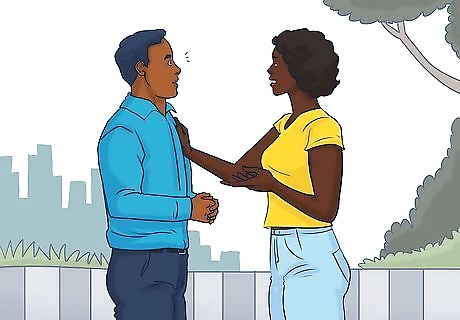
Show empathy. Be compassionate and remember the other person’s feelings. Take time to listen to and validate his response. Let him know you appreciate his vulnerability and value his feelings. You can say, “I know you must be feeling hurt or confused right now. I appreciate you asking me out. That takes a lot of courage and I can’t imagine how hard that is.” You might ask, “Is there anything you need to feel more comfortable? I know it might be weird since we still have to go to school together.”

Suggest alternatives. If you trust or like the person who asked you out, but don’t want to date her, you might be able to offer your help in other ways. Suggest other options for how the two of you could have a relationship. Suggest a friend who might be a good fit for her to date. Get your friend’s permission first. Ask if the two of you could just be friends, if you aren’t already. Ask for more time if you’re unsure of your decision or can’t agree to a date right now, but are interested in dating her in the future. Suggest spending more time with her one-on-one if you don’t know her well, but would like to get to know her better before formally dating her.

Be safe. Beware of people who persist to ask you out or refuse to accept your refusal. Watch out for reactions of anger or abusive language. If something about the person is disturbing, offensive, or inappropriate when you refuse him, you can ensure your safety by: Letting someone know where you are, if you’re alone with him. Leaving the situation immediately and going to where there are other people. Blocking him on any social media applications or dating websites where you talk to him. Avoiding responding to his phone, email, or text messages. Avoiding being alone with him in person in the future. Reader Poll: We asked 600 wikiHow readers, and 63% agreed that if a person reacts negatively to your rejection of them, it’s 100% okay to be firm in your decision and move on from the situation. [Take Poll] And if they do anything that makes you feel uncomfortable or unsafe, reach out to your parents, a teacher, or the authorities right away. Your safety is the top priority!
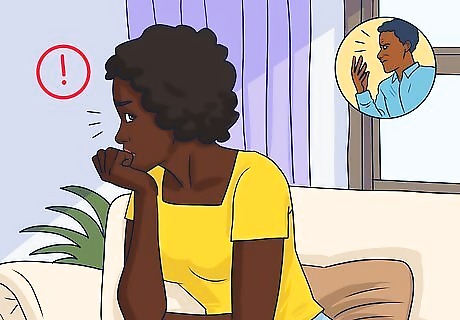
Deal with feelings of guilt. While you may be graceful in your refusal, the other person may not take it so well and have a strong negative reaction. This may lead you to feel guilty — maybe you should have said yes, just to be nice? — or the person may try to outright guilt-trip you, but you don't need to feel bad or guilty about being honest and genuine to what you are feeling and thinking. You can't force yourself to feel a certain way, and if you're not connecting with that person on a romantic level, you can't talk or trick yourself into feeling that connection. The person's reaction is her own, and if she reacts poorly, you are not responsible for that.














Comments
0 comment